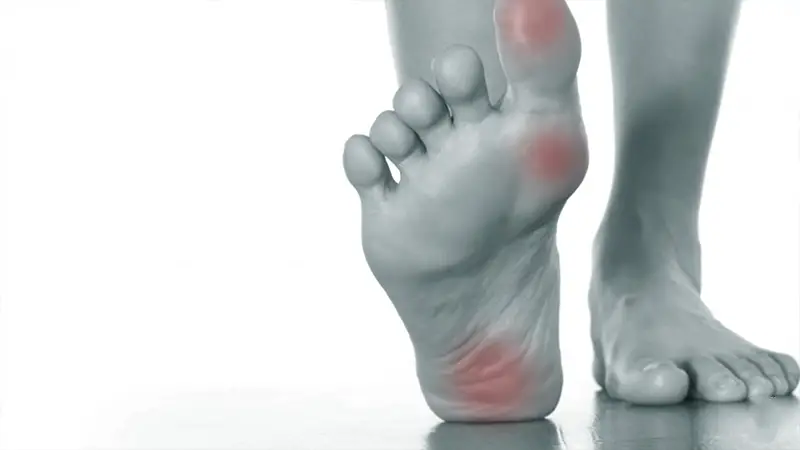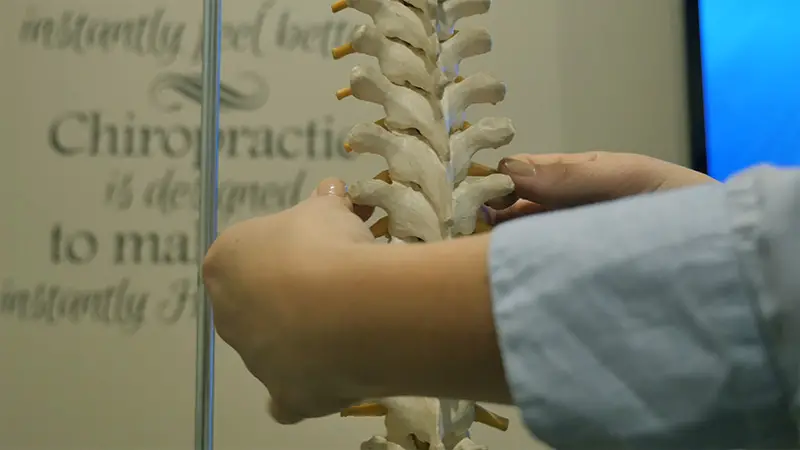Have you ever wondered why, on occasion, your body tingles after a meal? It’s a curious sensation that many of us have experienced, often leaving us with questions about its origins and implications.
In this blog post, we’ll delve into the fascinating world of post-meal tingling, exploring why my body tingles after eating.
From the tingling lips after devouring a spicy dish to the unexpected sensation in your fingers or toes, we’ll uncover the mysteries behind these bodily reactions.
We’ll examine the influence of factors like spicy foods, allergies, blood sugar levels, and even stress on post-meal tingling.
The reasons behind this phenomenon can provide clarity and help you distinguish between normal occurrences and those that warrant medical attention.
So, let’s embark on this journey to demystify the tingling sensations that follow a meal and gain insights into our body’s intricate responses.
Common Causes of Normal Tingling Sensations

Tingling sensations, also known as paresthesia, can occur for a variety of reasons, some of which are completely normal and harmless. Here are some common causes of normal tingling sensations:
Temporary Pressure
Sometimes, tingling can occur when you put pressure on a nerve, such as when you sit with your legs crossed for an extended period. This usually resolves when you change your position.
Temporary Restriction of Blood Flow
If you sit or lay on a limb for a while, you may experience tingling due to reduced blood flow. This is often referred to as “pins and needles” and goes away when you move and blood flow is restored.
Extremities “Waking Up”
When you wake up in the morning, you may experience tingling in your hands or feet. This is typically due to temporary compression of nerves during sleep, and it usually goes away quickly as you move around.
Mild Anxiety or Stress
Anxiety or stress can cause a variety of physical sensations, including tingling. This is usually due to increased adrenaline levels and is temporary.
Vibration or Pressure on a Nerve
If you’ve been using a vibrating tool or have been resting your elbow on a hard surface for an extended time, you may feel tingling as a result of pressure on a nerve.
Temperature
Extreme cold or heat can cause tingling sensations in the skin. Exposure to cold may lead to “frostbite” tingling, while exposure to heat may lead to “heat prickles.”
Mild Dehydration
Dehydration can sometimes lead to tingling sensations, especially in the extremities.
Exercise
After intense physical activity, you may experience tingling in your muscles. This is often referred to as “muscle fatigue” and is a normal response to exertion.
Nervousness or Excitement
Strong emotions, whether positive (excitement) or negative (nervousness), can sometimes trigger tingling sensations.
Menstruation
Some women experience tingling sensations in their breasts or nipples as part of their menstrual cycle. This is usually related to hormonal changes and is considered normal.
Positional Compression
Sitting or lying in an awkward position for an extended period can compress nerves and lead to tingling. This is often referred to as “falling asleep” in a limb.
It’s important to note that while these causes of tingling are generally normal and temporary, or severe tingling that is accompanied by other symptoms like weakness, or changes in vision should be evaluated by a medical professional.
Is It Normal If My Body Tingles After Eating?
Experiencing tingling sensations in your body after eating can be normal in certain circumstances, but it’s crucial to differentiate between benign causes and those that may signal an underlying issue.
Common, harmless causes of post-meal tingling include consuming spicy foods or experiencing temporary changes in blood flow, often referred to as “pins and needles.”
However, tingling can also be linked to less common factors, such as allergies, blood sugar fluctuations, or vitamin deficiencies.
It’s essential to consider the context, severity, and accompanying symptoms. Occasional, mild tingling that quickly resolves is often no cause for concern.
However, persistent, severe, or frequently recurring tingling, especially when accompanied by weakness, pain, changes in vision, or other unusual sensations, may warrant medical evaluation.
Consult with a healthcare professional to determine the underlying cause and receive appropriate guidance for managing post-meal tingling.
Why Does My Body Tingle After Eating?
Experiencing tingling sensations in the body after eating, although not common, can occur due to various potential causes.
It’s important to note that these causes can range from benign to more serious, and if you frequently experience, you should consult a healthcare professional. Here are some potential causes of post-meal tingling:
Spicy Foods
Consuming spicy foods, such as those containing capsaicin, can lead to tingling sensations, especially in the mouth and lips.
This is a common and harmless reaction to the stimulation of nerve receptors by the spicy compounds.
Allergies
Food allergies can cause tingling sensations in the mouth and throat as part of an allergic reaction.
Common allergens like nuts, shellfish, or certain fruits can trigger this response. Anaphylaxis, a severe allergic reaction, can also lead to tingling and requires immediate medical attention.
Oral Allergy Syndrome (OAS)
Some individuals with pollen allergies may experience tingling or itching in the mouth and throat after consuming raw fruits, vegetables, or nuts due to cross-reactivity between certain proteins in these foods and pollen allergens.
Niacin (Vitamin B3) Overdose
Excessive consumption of niacin-rich foods or niacin supplements can lead to a condition known as niacin flush.
This condition includes symptoms like tingling, redness, and warmth of the skin, particularly in the face and neck.
Gastrointestinal Issues
Certain gastrointestinal conditions, such as gastroesophageal reflux disease (GERD) or acid reflux, can cause irritation of the esophagus, leading to tingling or discomfort in the chest or throat area after eating.
Hypoglycemia (Low Blood Sugar)
A sudden drop in blood sugar levels after consuming a high-carbohydrate meal can lead to tingling sensations. Hypoglycemia can also cause symptoms like dizziness, confusion, and sweating.
Vitamin and Mineral Deficiencies
Deficiencies in vitamins and minerals, particularly vitamin B12 and calcium, can lead to tingling sensations in the extremities, known as peripheral neuropathy.
This condition may become more noticeable after eating when blood flow is redirected to the digestive system.
Gastrointestinal Allergies or Sensitivities
Some individuals may have food sensitivities or allergies that primarily affect the gastrointestinal tract, leading to tingling or discomfort in the abdominal area after eating certain foods.
Migraines
For some people, certain foods or food additives can trigger migraines, which may include neurological symptoms like tingling or numbness in various parts of the body.
Anxiety and Panic Attacks
Intense emotions, including anxiety and panic attacks, can lead to tingling sensations as part of the body’s stress response.
Medications
Some medications, particularly those used to treat high blood pressure or diabetes, can cause tingling sensations as a side effect. This is known as drug-induced peripheral neuropathy.
It’s crucial to remember that tingling sensations after eating should not be ignored, especially if they are frequent, or associated with other concerning symptoms like difficulty breathing,or altered consciousness.
How to Manage Post-Meal Tingling?

Managing post-meal tingling depends on the underlying cause. If you experience occasional, mild tingling sensations after eating, you may try the following general strategies:
Identify Trigger Foods
If you suspect that certain foods are causing the tingling, keep a food diary to track your symptoms and identify potential triggers. Once identified, you can consider avoiding or limiting those foods.
Eat Smaller Meals
Consuming smaller, more frequent meals throughout the day can help stabilize blood sugar levels, potentially reducing tingling associated with blood sugar fluctuations.
Stay Hydrated
Dehydration can contribute to tingling sensations. Ensure you drink an adequate amount of water throughout the day, especially if you’ve consumed salty or spicy foods.
Manage Stress
Stress and anxiety can exacerbate tingling sensations. Engage in relaxation techniques like deep breathing, meditation, or yoga to manage stress levels.
Chew Food Slowly
Chewing your food thoroughly and eating slowly can aid digestion and reduce the likelihood of gastrointestinal discomfort that may lead to tingling.
Avoid Food Allergens
If you suspect food allergies are causing tingling, consult an allergist for allergy testing and follow their guidance on allergen avoidance.
Consider Dietary Changes
Consult a healthcare provider or dietitian to discuss potential dietary changes or supplements if your tingling is related to vitamin or mineral deficiencies.
Medication Review
If you suspect medication side effects, consult your healthcare provider to explore alternative medications or adjust dosages.
Raise the Head of Your Bed
If you experience tingling as a result of acid reflux or GERD, try elevating the head of your bed to prevent stomach acid from flowing back into your esophagus.
Exercise Regularly
Physical activity can help regulate blood sugar levels, improve circulation, and reduce stress. Consult with a healthcare provider before starting a new exercise routine, especially if you have underlying health conditions.
Stay Informed
Stay informed about your health, especially if you have a chronic condition that may contribute to tingling sensations. Follow your healthcare provider’s recommendations and attend regular check-ups.
Seek Medical Attention
If your post-meal tingling is severe, persistent, or accompanied by concerning symptoms such as difficulty breathing, chest pain, or altered consciousness, seek immediate medical attention.
These could be signs of a serious medical condition.
Remember that the key to managing post-meal tingling is identifying and addressing the underlying cause.
When to Contact a Doctor Because of Body Tingling?
Tingling sensations in the body can be caused by a wide range of factors, some of which may be benign and temporary, while others may indicate a more serious underlying condition.
Here are some situations in which you should contact a doctor because of body tingling:
Sudden or Severe Tingling
If you experience sudden, intense, or severe tingling sensations, especially if they come on suddenly and are accompanied by other concerning symptoms such as weakness, confusion, or difficulty speaking, seek immediate medical attention.
These could be signs of a stroke or other neurological emergency.
Tingling Lasting More Than a Few Minutes
If tingling persists for an extended period, especially if it lasts more than a few minutes to an hour, it’s a cause for concern. Chronic or recurrent tingling may be indicative of underlying medical conditions like neuropathy or circulation problems.
Tingling Associated with Injury
If tingling occurs after an injury or trauma, it’s important to get medical attention, as it could be a sign of nerve damage or a more serious injury.
Accompanying Weakness
If tingling is accompanied by muscle weakness or difficulty moving a limb, it may indicate a neurological problem, and you should see a doctor promptly.
Tingling with Chest Pain
Tingling in the chest, especially if it’s accompanied by chest pain, shortness of breath, or other heart-related symptoms, requires immediate medical evaluation, as it may be a sign of a heart attack or angina.
Tingling After a Tick Bite
If you’ve been bitten by a tick and develop tingling sensations or any neurological symptoms, it could be a sign of Lyme disease, which requires medical treatment.
Changes in Vision
If tingling is accompanied by changes in vision, such as blurriness, double vision, or visual disturbances, it may be related to a neurological or eye condition and should be assessed by a healthcare provider.
Tingling During Pregnancy
Pregnant women who experience tingling sensations, especially if it’s persistent, should contact their obstetrician or healthcare provider to rule out pregnancy-related complications or conditions like gestational diabetes.
Other Unexplained Symptoms
If tingling is accompanied by other unexplained symptoms, such as difficulty swallowing, speech problems, coordination issues, or changes in mental function, it’s important to consult a doctor for a comprehensive evaluation.
Underlying Medical Conditions
If you have a known medical condition such as diabetes, multiple sclerosis, or a history of strokes, and you experience new or worsening tingling sensations, it’s essential to inform your healthcare provider and seek guidance.
Remember that tingling can sometimes be a sign of a serious medical condition, so it’s better to err on the side of caution and seek medical advice if you have any doubts or concerns about your symptoms.
FAQs
Why does my mouth tingle after eating spicy foods?
Spicy foods contain capsaicin, which stimulates nerve receptors in the mouth, leading to a tingling sensation. This is a normal reaction and not a cause for concern.
Can food allergies cause tingling after eating?
Yes, food allergies can trigger tingling, especially in the mouth and throat. If you suspect an allergic reaction, seek medical attention immediately.
Why do I feel tingling in my fingers after a big meal?
Overeating can divert blood flow to the digestive system, reducing circulation to the extremities and causing temporary tingling. It’s a normal response and typically resolves as digestion progresses.
Is post-meal tingling related to diabetes?
Yes, it can be. High or low blood sugar levels in people with diabetes may lead to tingling sensations. Monitoring your blood sugar levels and following a diabetes management plan can help prevent this.
Can stress cause tingling after eating?
Yes, stress and anxiety can trigger tingling sensations. Stress affects the nervous system, leading to various physical symptoms, including tingling.
Practicing relaxation techniques and managing stress can help alleviate this.
Wrapping Up
In the realm of bodily sensations, post-meal tingling is a common yet intriguing phenomenon.
As we conclude our exploration into “Why Does My Body Tingle After Eating?” it’s essential to remember that while occasional tingling is often harmless and easily explained.
Some pod the facts like spicy foods or stress, persistent or severe tingling accompanied by concerning symptoms should not be ignored.
Knowing the potential causes, whether related to food allergies, blood sugar, or underlying medical conditions, empowers us to make informed decisions about our health.
Should you ever find yourself in doubt or discomfort regarding post-meal tingling, seeking advice from a healthcare professional is always a prudent step.
With this knowledge, you can savor your meals with confidence, knowing that your body’s responses are well within the realm of understanding and care.
Hi, I’m Mark Pattinson and I’m a freelance personal trainer. I’ve been working in the fitness industry for over 10 years especially since I work with diabetes patients and I love helping people achieve their fitness goals. I believe that everyone can benefit from a good workout, and I’ll do everything to make sure you get the most out of your training.
